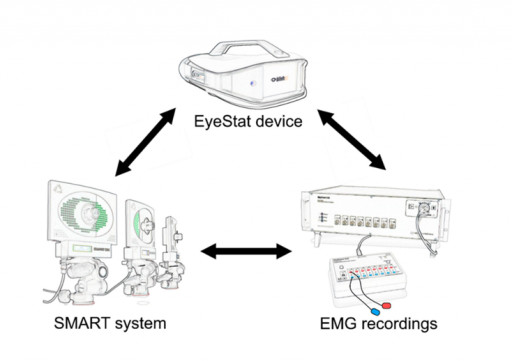
CHARLESTON, S.C., March 9, 2023 (Newswire.com) - An independent study titled "Validating a Portable Device for Blinking Analyses through Laboratory Neurophysiological Techniques," carried out by prominent blink researcher Matteo Bologna, M.D., sheds light on technological solutions that can help millions of people with neurological diseases around the world. The study compared revolutionary blink reflex technology by blinkcns, Inc., called EyeStat, with standard lab techniques and concluded that the former provides reliable and accurate measures.
The technology is the brainchild of The Medical University of South Carolina (MUSC) and was licensed by blinkcns, a South Carolina-based biotech company that holds the worldwide rights to stimulating and analyzing the blink reflex to help improve the detection and management of neurological disease and conditions like Parkinson's, ADHD, and TBI.
Their FDA-cleared technology, EyeStat, uses 8 light puffs of air to stimulate a patient's blink reflex in a 30-second test. The technology can also be configured to measure a patient's spontaneous or voluntary blink, requiring no stimulus. The system employs high-speed videography to capture and record the eyelids and measure various parameters of the blink reflex using a proprietary algorithm.
In the study, Dr. Bologna recorded eye-blink kinematics using traditional laboratory-based techniques and compared it with the data obtained from the portable EyeStat device. To conduct the analysis, sixteen healthy adults underwent spontaneous and voluntary blink recordings and used the SMART motion analysis system and EyeStat device. The recorded blinking data showed a linear relationship with the outcome collected with the SMART system (p ranged from <0.001 to 0.02; r ranged from 0.85 to 0.57).
These outcomes showed high reliability and accuracy of a blinking analysis compared to traditional processes. The study concluded that EyeStat, due to its portable nature and underlying technology, makes recording blinking more accessible in daily clinical practice and research activities. This would allow for future large-scale studies with patients with neurological diseases and healthy subjects in diverse clinic settings. During the experimentation session, none of the participants experienced any adverse effects.
Referring to the study, blinkcns CEO Ryan Fiorini said, "The eyes are the window into the brain. The blink reflex, specifically, can tell a whole story about what's going on in the brain neurologically. We want to thank Dr. Bologna for the invaluable independent research that will undoubtedly shed light on the scientific advantages of using this technology to assess the blink reflex. We hope it will go a long way to helping people across the globe in various clinical settings."
Using the portable device, data can easily be obtained in patients with neurological conditions or neurodegenerative diseases, specifically ADHD, TBI, and Parkinson's, blinkcns' main research areas. Another application is to generate valuable data to monitor the short to long-term effects of surgery and drugs.
People interested in reading the insightful scientific publication about blink reflex can visit the following link: https://www.mdpi.com/2076-3425/12/9/1228/html.
About blinkcns: Blinkcns (formerly blinktbi) is a Charleston, SC-based biotech company dedicated to improving the detection and management of neurological disease through rapid, non-invasive collection of objective data from the eyes. The company holds the world-wide rights to stimulating and analyzing the blink reflex by the means of air, sound or light. Their FDA-cleared technology, called EyeStat, measures the blink with gentle air puffs to provide objective data about the brain. With foundational research in traumatic brain injury (TBI), the company is exploring clinical programs in other neurological disease states and conditions such as Parkinson's, ADHD, Dry Eye, and more.
Contact Information:Jackie McKelvey
Chief Operating Officer
[email protected]
9083300802
Original Source: An Independent Study Comparing Blink Reflex Detection Device EyeStat to Standard Lab Techniques Concludes That the Device Provides Reliable and Accurate Measures